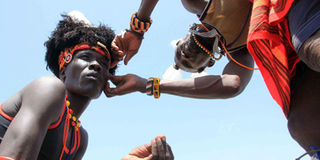Pastoralists turn to cultural festivals to promote peace

Turkana dancers prepare for a dance during a cultural festival earlier in June 2014. Cultural festivals have now been adopted as a means of promoting peaceful co-existence between the Turkana and the Pokot. The two communities have been involved in cattle raids against each other. PHOTO/JOSEPH KANYI
What you need to know:
- This is intended to contain armed conflict over cattle raids and banditry that has claimed over 20 lives in the past one month.
- The two communities have for a long time been engaged in protracted armed raids that have impacted negatively on their socio-economic livelihoods.
- The peace event brought together Turkanas from Loyapat and Kainuk and Pokots from Sarmach and Orwa divisions.
- West Pokot County government and humanitarian agencies operating in the region are equipping reformed youth with business skills.
The warring Turkana and Pokot pastoralists have now turned to cultural exchange programmes and folk media to promote harmonious existence between them.
This is intended to contain armed conflict over cattle raids and banditry that has claimed over 20 lives in the past one month.
The pastoralists from West Pokot and Turkana Counties Saturday held cultural events on the common border in an effort to build lasting peace and promote trade.
The two communities have for a long time been engaged in protracted armed raids that have impacted negatively on their socio-economic livelihoods.
The event sponsored by the Finish Church and the Catholic Diocese of Eldoret, Kitale and Turkana brought together administrators, security teams, elders and reformed warriors from the two communities.
“We are engaging leaders from both communities in coming up with a long lasting peace strategy that will help improve their socio-economic status as opposed to such retrogressive acts like cattle raids,” said Elijah Kodo, Turkana South Sub-County Commissioner.
The Pokots and Turkanas have been involved in recurrent attacks that have led to killings and displacement of several families.
The peace event brought together Turkanas from Loyapat and Kainuk and Pokots from Sarmach and Orwa divisions.
They shared meals and performed common traditional dances as a symbol of reconciliation.
“What is required is a home grown solution to insecurity and not forceful disarmament that has proved to be disastrous,” said Ekuam Erakai from Kainuk.
REFORMED YOUTH
At the same time, youths who have quit cattle rustling and banditry in West Pokot County are being assisted to set up businesses and earn a better living.
The West Pokot County government and humanitarian agencies operating in the cattle rustling prone region are equipping the reformed youth with business skills to enable them engage in profitable income generating projects.
Similar enterprises are going on at the Kenya-Uganda border to check on cross-border cattle raids and promote trade to improve livelihoods.
“There are several emerging resources and opportunities that are replacing cattle rustling and banditry and the realisation of development in the region,” said Simon Kachapin, Governor, West Pokot County.
The United Nations Development Programme (UNDP) through the National Drought Authority has given Sh1.2 million for some of the groups to expand their business projects and investments.
The groups are based in Makutano Township and other parts of the semi-arid region.
CREDIT FACILITIES
Most of them have formed groups, got credit facilities from the government and micro-finance institutions and invested in income generating activities.
“We can now access loans and get enough capital to expand our businesses unlike in the past when we viewed the risky act of cattle raids as source of wealth,” said Ribo Ywaput, Chairman Lomakalas Reformed Group in Kacheliba Division, Pokot North Sub-County.
They ventured into business projects after witnessing some of their colleagues killed during cattle raids.
“We have formed monitoring groups to keep track of the teams and encourage notorious cattle rustlers and bandits to venture into meaningful socio-economic activities,” said James Domongole, Chairman Kanyerus Reformed Warriors group.
The group deals in livestock trade, transport business and horticulture and has established partnership with their Ugandan counterparts as part of the peace building process.
The Pokots are found both in Kenya and Uganda and practice pastoralism as a means of livelihood.





